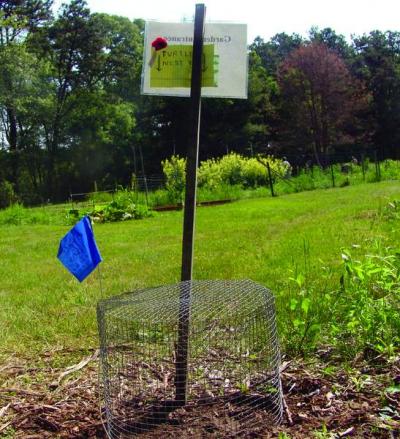Reptilian perennials at the Wareham Community Garden
They were an unexpected guest last year at the Wareham Community Gardens, and this year it looks like they're going to sprout again.
Not zucchini. Baby turtles.
For the second year in a row, painted turtles have planted their eggs in the Wareham Community Garden. This year, gardeners even caught one of the mother turtles in action!
On Monday evening, resident Dick Wheeler observed a painted turtle nesting in the garden off of Tihonet Road and reported his sighting to Don Lewis, "The Turtle Guy," and the executive director of the Massachusetts Association of Conservation Districts, to devise a plan to protect the soon-to-be hatchlings.
Wednesday morning, Wheeler was joined by Sue Wieber Nourse, CEO of Cape Cod Consultants and a research scientist, to install a nest protector over the eggs to prevent predators from destroying the nest (and gardeners from stepping on it, as it was located in the middle of the main pathway!) While Wieber Nourse and Wheeler were working to protect the nest, another painted turtle climbed out of the wetlands, crawled into the gardens and found a suitable spot to plant her own crop of six eggs!
Watching quietly and carefully from a distance so as not to disturb the nervous turtle, they observed the entire nesting process. The turtle excavated the egg chamber, deposited six elongated eggs one at a time, then painstakingly covered the nest and disguised its location.
Because this turtle had laid its clutch in the busiest portion of the community gardens, Wieber Nourse decided to relocate the eggs under the same protective predator excluder as the original nest to give them the best chance of survival.
According to Wheeler, three different species of turtles have now dug six nests in the garden since it opened last year.
"It's a turtle garden!" Wheeler said.
Turtle Guy Lewis said that its likely that the turtles will be returning to the garden for a long time.
"They have nesting-site fidelity," said Lewis, explaining that they return to the same spot year-after-year, which is probably the same site where they were hatched, so they know it was successful.
"It's not their big brains... which they don't have," Lewis said. "It's millions of years of evolution."
However, the eggs face several challenges; the least problematic of which are community gardeners.
"Normally eggs would be predated by raccoons, skunks, larger birds, fox, any large mammal that has to feed its young this time of year," Lewis said. "They're good, delicious protein if you're a predator."
And once the next generation of turtles hatches (in approximately 60 to 90 days depending the temperature, the inch-long, quarter-of-an-ounce hatchlings face depredation by anything larger than them...basically most everything.
But if all goes well, this summer's hatchlings will return to plant their own "crop" in the community garden. The protection that they are receiving at the community garden is a great start.
"Everybody there is just pleased as punch to have them, it's a very nice symbiotic relationship among the gardeners and the turtles," said Lewis.
Check out video of the turtle laying her eggs, below. Thank you, Don Lewis! Also check out www.turtlejournal.com for more stories on Don and Sue's adventures with reptiles across the Cape!














